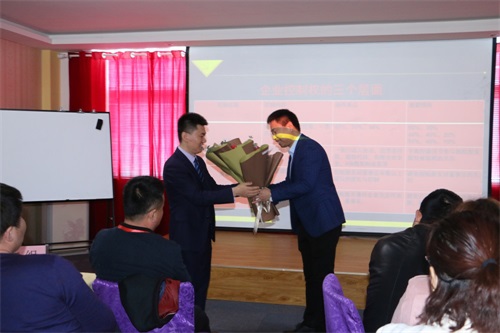

公司動態(tài)
股權(quán)激勵Equity incentive
山東股權(quán)激勵對象動態(tài)調(diào)整機制解析
發(fā)布時間:2025-05-25 來源:http://zyvd.cn/
股權(quán)激勵是企業(yè)與核心人才綁定利益、激發(fā)潛能的重要工具,。但在實踐中,,企業(yè)常面臨一個難題:如何確保激勵對象始終與戰(zhàn)略目標(biāo)保持一致?這就需要建立一套科學(xué)的動態(tài)調(diào)整機制,,讓股權(quán)激勵“活起來”,。
Equity incentives are an important tool for enterprises to bind interests and stimulate potential with core talents. But in practice, companies often face a challenge: how to ensure that incentive targets are always aligned with strategic goals? This requires the establishment of a scientific dynamic adjustment mechanism to make equity incentives "come alive".
一、為何需要動態(tài)調(diào)整,?
1,、 Why do we need dynamic adjustments?
企業(yè)發(fā)展是動態(tài)過程,人員流動,、崗位變動,、績效波動都是常態(tài)。若股權(quán)激勵方案一成不變,,可能出現(xiàn)“躺平者持續(xù)獲益”或“新貢獻者無法參與”的矛盾,。動態(tài)調(diào)整的核心邏輯,是通過定期評估與靈活調(diào)整,,讓激勵資源向高價值創(chuàng)造者傾斜,,同時規(guī)避“股權(quán)固化”風(fēng)險。
Enterprise development is a dynamic process, and personnel turnover, job changes, and performance fluctuations are all normal occurrences. If the equity incentive plan remains unchanged, there may be a contradiction between "the flat will continue to benefit" or "new contributors cannot participate". The core logic of dynamic adjustment is to tilt incentive resources towards high-value creators through regular evaluations and flexible adjustments, while avoiding the risk of "equity solidification".
二,、調(diào)整機制的設(shè)計要點
2,、 Key design points of adjustment mechanism
考核指標(biāo)體系化
Systematization of assessment indicators
需建立多維評估標(biāo)準(zhǔn),例如:
Multi dimensional evaluation criteria need to be established, such as:
崗位價值:根據(jù)戰(zhàn)略重要性劃分崗位層級,,關(guān)鍵崗位優(yōu)先配置,;
Job value: Classify job levels based on strategic importance, and prioritize the allocation of key positions;
績效貢獻:結(jié)合KPI或OKR完成度,量化個人產(chǎn)出,;
Performance contribution: Quantify individual output by combining KPI or OKR completion;
文化契合度:通過360度評估或價值觀考核,,篩選與企業(yè)同頻者。
Cultural fit: Through 360 degree evaluation or value assessment, select individuals who share the same frequency with the company.
調(diào)整周期靈活化
Adjust cycle flexibility
調(diào)整頻率需平衡管理成本與激勵效果,。通??稍O(shè)置:
Adjusting frequency requires balancing management costs and incentive effects. Usually, it can be set:
年度校準(zhǔn):結(jié)合年終績效評估,調(diào)整次年激勵份額,;
Annual calibration: Adjust the incentive share for the following year based on the year-end performance evaluation;
觸發(fā)式調(diào)整:針對重大項目節(jié)點或崗位異動,,即時動態(tài)分配。
Trigger based adjustment: Real time dynamic allocation for major project milestones or job changes.
退出規(guī)則清晰化
Clear exit rules
需提前約定退出場景與處理方式,,例如:
It is necessary to agree in advance on the exit scenario and handling method, for example:
主動離職:已歸屬股權(quán)可保留,,未歸屬部分自動失效;
Voluntary Resignation: Equity that has already been attributed can be retained, and the portion that has not been attributed will automatically become invalid;
績效不達(dá)標(biāo):設(shè)置緩沖期,,連續(xù)兩年未達(dá)標(biāo)則啟動回購,;
Performance not meeting standards: Set a buffer period, and initiate repurchase if the performance is not met for two consecutive years;
崗位晉升:根據(jù)新崗位價值重新核定激勵額度。
Promotion: Re evaluate the incentive amount based on the value of the new position.

三、常見調(diào)整模式
3,、 Common adjustment modes
增量分配法
Incremental allocation method
每年預(yù)留部分股權(quán)作為“激勵池”,,根據(jù)年度評估結(jié)果,向高績效者追加分配,。例如,,某科技企業(yè)每年將10%新增股權(quán)用于動態(tài)調(diào)整,連續(xù)三年績效TOP20%的員工可獲得額外配股,。
Reserve a portion of equity each year as an "incentive pool" and allocate additional funds to high performers based on the annual evaluation results. For example, a technology company allocates 10% of its newly acquired equity annually for dynamic adjustments, and employees who rank among the top 20% in performance for three consecutive years can receive additional rights issues.
存量調(diào)整法
Stock adjustment method
對已授予股權(quán)進行再分配,,需謹(jǐn)慎設(shè)計以避免法律風(fēng)險。常見操作包括:
The redistribution of granted equity should be carefully designed to avoid legal risks. Common operations include:
股權(quán)回購:企業(yè)按約定價格回購低效貢獻者的股權(quán),,重新分配給新晉人才,;
Equity repurchase: Enterprises repurchase the equity of inefficient contributors at the agreed price and redistribute it to new talents;
內(nèi)部轉(zhuǎn)讓:允許激勵對象之間協(xié)商轉(zhuǎn)讓,但需設(shè)定價格指導(dǎo)區(qū)間,。
Internal transfer: It is allowed for incentive objects to negotiate transfers, but a price guidance range must be set.
差異化解鎖法
Differentiated unlocking method
將股權(quán)解鎖與動態(tài)考核掛鉤,,例如:
Linking equity unlocking with dynamic assessment, for example:
分階段解鎖:設(shè)置3-4年解鎖期,每年解鎖比例與年度考核結(jié)果綁定,;
Phased unlocking: Set a 3-4 year unlocking period, and bind the annual unlocking ratio with the annual assessment results;
里程碑解鎖:將股權(quán)解鎖與企業(yè)戰(zhàn)略節(jié)點(如融資、上市,、營收目標(biāo))關(guān)聯(lián),。
Milestone unlocking: Associate equity unlocking with strategic nodes of the enterprise, such as financing, listing, and revenue targets.
本文由山東股權(quán)激勵友情奉獻.更多有關(guān)的知識請點擊:http://zyvd.cn真誠的態(tài)度.為您提供為全面的服務(wù).更多有關(guān)的知識我們將會陸續(xù)向大家奉獻.敬請期待.
This article is about Shandong Equity Incentive Friendship Dedication For more information, please click: http://zyvd.cn Sincere attitude To provide you with comprehensive services We will gradually contribute more relevant knowledge to everyone Coming soon.
本站聲明
本網(wǎng)站為非營利性網(wǎng)站,,旨在宣揚股權(quán)知識,交流職業(yè)學(xué)習(xí)心得,。網(wǎng)站內(nèi)部分文章來自其它網(wǎng)站,,只做交流學(xué)習(xí)之用。相應(yīng)的權(quán)力均屬于原權(quán) 力人,,如權(quán)利人認(rèn)為不妥,,請來電來函說明,本網(wǎng)站隨既停止或使用,,謝謝合作,! 13698613138
13698613138
微信公眾號

掃碼獲知更多知識

抖音二維碼
山東股章企業(yè)管理顧問有限公司 備案號:魯ICP備19050574號-2 網(wǎng)站建設(shè)·推廣運營 網(wǎng)站地圖 XML TXT

截屏,微信識別二維碼